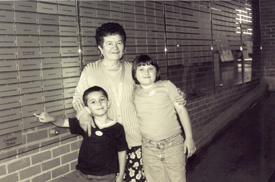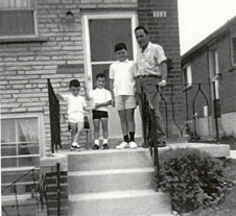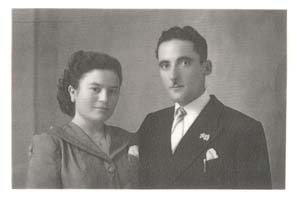Sobey Wall of Honour
Column
66
Row
25
MARIA MARRONE
Born: Maria Di Girolamo
August 25, 1933
Fossacessia, Italy
Immigration: 1956
Date of Departure: April 14, 1956, Napoli, Italy
Date of Arrival: April 24, 1956, Fort Erie, Ontario
Sailing Ship: SS Constitution
Destination: Sudbury Ontario
Occupation: Housewife /Seamstress/Factory Employee
Died: May 13, 2004 Toronto, Ontario
Maria was born in Fossacesia, "Blind Ditch." It is a village surrounded by sea, river, farmland, and hills. In 1933, the year of her birth, the routines of living seemed hardly changed from the previous hundreds of years: farmers toiled on the land like the bygone generations; women carried the same baskets; and the fisherman harvested the waters with the trabocchetti of their grandfathers. She was born a middle child, the only girl, in an age ever more stifled by poverty. Life was simple. It was hard. The nearby Sangro River swelled and cowered with the seasons, and the essential necessities of life steadily withered as the Second World War encroached; there was little food, education, and increased loss of life. Modernity came to the village with the onset of fighting in the region. Planes, tanks, and foreign armies raped the earth and carved a path of destruction that scarred the land forever, bequeathing a legacy of constant "leaving."
Maria was indicative of the women of that time. She braved the hardships and valued the shoals of goodness in a rocky world. In Italy, her life was Spartan, often staid, but never bitter. She got married at nineteen on a day that was as unassuming as the event itself—just she and her husband, and some flowers.
Marriage brought loneliness, for her husband left for Canada shortly afterward, and she would bide her time for three more years watching others leave, watching an exodus that seemed like wildfowl abandoning a fruitless tree.
In 1956, she, too, flew the unyielding branches of Italy to join her husband. Without a whimper she sailed across the ocean to a country sated with snow, forests, and thinly laid settlements stretching vast distances. By train, the journey seemed numbing yet real. Long and anxious.
They settled in Toronto, and endured a new kind of hardship that was as alien as the language, as foreign as the colours of human skin, and as strange as the degrees of coldness. Yet, it was fraught with hope, the kind of hope that is pure and unbreakable. She thrived, made a nest, and had three children.
Life was not simple here, but it was good. A good woman. A good mother. But in the reverie of good things she contended with matters decreed by fate: the death of her husband at a young age; raising three boys alone; and managing her house by the most menial jobs, sewing garments and cleaning. These did not define her, however. Rather, it was the effect on those she loved, those who found inspiration in the subtlest things she did, selfless and great. This could not be more evident than when she struggled with her illness.
In the days before she died, the sun usually spurted through the window and shone on her yellowed skin. She could not talk, even think; yet, if there were something to be said in those numbed hours of pain, it was uttered by the brown birds on the rooftops and adjacent trees. With each chirp came a song declaring: there is a special providence in the fall of a sparrow.
Maria and Giovanni Marrone, May 16, 1953 are pictured.


